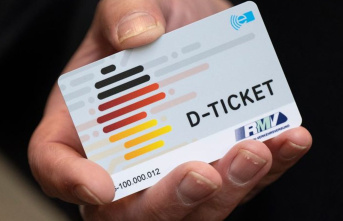Competition in the West and East, wars and crises: the EU heads of state and government want to quickly adapt the economic policy of the international community to current challenges.
In view of geopolitical tensions and the subsidy policies of some countries, Europe needs an economic policy change, wrote the leaders of the 27 EU member states in a final declaration of their summit in Brussels.
Chancellor Olaf Scholz said: "This is the largest internal market in the world, but it is far from having exhausted its potential and possibilities." A special report discussed at the summit gave new impetus to state aid for the economy that had previously been strictly regulated in Europe.
The EU is facing increasing competition, especially from the USA and China. From an EU perspective, both countries give their companies advantages with high subsidies, so that Europe loses out.
Mobilization of money as a key to investments
To ensure that the EU is not left behind, what is needed above all is money. “We need to mobilize more resources,” said EU Council President Charles Michel. In the summit declaration, leaders identify public and private financing as necessary for investments in key strategic areas and infrastructure.
In his special report, author Enrico Letta names mobilizing money from private individuals and companies as a priority. The former head of government of Italy was commissioned to carry out the analysis last year. According to the report, there are 33 trillion euros in private savings in the EU - mostly in cash and deposits. Every year, around 300 billion euros in savings of European citizens are diverted abroad - primarily to the USA, he writes in his report.
Against this background, after years without much progress, the heads of state and government pushed for “immediate” advancement of the Capital Markets Union, as the summit declaration states. It is the key to unlocking private capital. Specifically, the development of cross-border investment and savings products is to be accelerated. The member states were also able to make progress on two previously controversial points: They agreed to press ahead with work to harmonize important aspects of the national rules for corporate insolvency.
Strengthen more efficient supervision of capital markets and financial literacy
On the other hand, supervision of the capital markets in the EU should become more efficient. The heads of state and government commissioned the EU Commission to work out how European supervisory authorities can work better together - in order to better monitor the most important financial companies operating across borders. According to the final declaration, the general financial knowledge of citizens should also be strengthened. The hope is that those who have more knowledge and know-how are more likely to invest.
After the meeting, Scholz believes further progress in the integration of the European capital markets is possible. “The insufficiently developed capital market in Europe is probably the main reason why the growth dynamic in Europe is not as great as it is in some other places in the world,” said the SPD politician. "I believe that we will now finally see progress in this field."
Discussion about more state aid and reducing bureaucracy
With regard to public money, the heads of state and government want the European Investment Bank and the long-term budget of the international community to play a role.
The international community is also considering allowing more state aid in Europe in order to cushion the effects of state aid for companies in China and the USA. In his report, Letta argues that there should be stricter state aid rules at national level, but more public money for projects at EU level. Member states should be obliged to make part of their funds available for Europe-wide projects. The heads of state and government are calling on the Commission to significantly reduce the bureaucratic burden on companies and national authorities.







